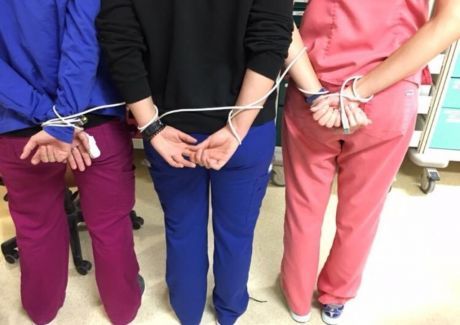Reports
You are here
Hull nurses stage second sit-in against austerity

August 21, 2018
On August 4, when a nurse at the Gatineau Hospital in Hull was told she needed to stay after a 12-hour shift to work mandatory overtime—and responded she was too exhausted—eight of her coworkers held a two-hour on-the-job protest in solidarity.
They stayed to work with her, demanding that the hospital pay two hours of overtime to all of them. They called it “travailler ensemble” (“working together”) or a “sit-in”: a job action that would not have an impact on patient care. Their message: “management has taken us hostage.” After a meeting with the union, which backed them, all nine nurses were sent home, and in the end no one did mandatory overtime. “It’s not up to them to make up the shortage,” said their rep.
Before the protest, a union petition had already been circulating amongst nurses in the Outaouais region, of which Hull is the major centre, for better working conditions, particularly short-staffing. But this was also the second time hospital employees in the region had taken direct action against the impacts of underfunding.
Regional inequity
Last February, Hull attendants, maintenance workers, and food service staff sat down in hallways to protest the extra workload and hours required to make up for staff shortages. Their union, the Syndicat des travailleuses et des travailleurs de la santé et des services sociaux de l'Outaouais (STTSSSO-CSN), represents about 4,200 health and social services workers in the Outaouais, but their action in February was part of Quebec-wide sit-ins to protest burnout of overworked healthcare staff.
Still, there is no denying that the Outaouais region has it particularly hard: it gets $250 million a year less in funding than other Quebec regions. Last spring Outaouais nurses produced a “Black Book” detailing the impacts of regional underfunding. In August the coalition “Équité Outaouais” released the results of a study it commissioned from IRIS, a progressive Quebec think tank, which painted a dismal picture not only of healthcare but also of funding for education and social justice. The region represents 4.7% of the population but 3.5% of healthcare funding, which means $1,938 per resident versus the Quebec average of $2, 569.
Just to be equal per capita to other already underfunded regions, the Outaouais would need 202 more specialist doctors and 1050 more nurses. The system lacks 185 short-term beds—the equivalent of a hospital—and 466 long-term beds, forcing tens of thousands to seek care across the nearby border with Ontario.
After the IRIS report came out, Liberal Health Minister Gaetan Barrette announced $300 million for interregional equity in healthcare. However, the share of this for the Outaouais is only 16 million—well short of the missing annual 250 million.
Election and job action
Healthcare is the number one issue on voters’ minds in the region and in many parts of Quebec. With an election coming up on October 1 the Liberals are scrambling to appear responsive to healthcare job actions. So have the opposition candidates of the CAQ and PQ.
But the only party in the race that has had a consistent position for a massive reinvestment in healthcare in both its election platform and party program is Québec solidaire (QS). Since February, QS has been reaching out to healthcare workers to build a movement that can push back against the pressure on staff to make up the shortfall.
While the election will give voice to the anger over underfunding and regional inequity, there is a danger the right-wing CAQ’s campaign against the Liberals failure will capture that sentiment, even though it does not propose the solution that’s needed. That solution lies not only in regional equity, but in prioritizing Quebec’s public healthcare network of hospitals, community clinics and health centres, which was a model before it was starved of funds.
This is what motivated specialist doctors across Quebec to refuse their salary increase last spring and demand that it be invested in nurses and other healthcare staff, and in funding the system—a demand which they made again the day before the Hull nurses’ action.
This is why the fight for healthcare must be both at the ballot box and in the streets—and why it must continue in the hospital hallways where nurses and other healthcare workers are taking resistance into their own hands.
Section:
Topics:









